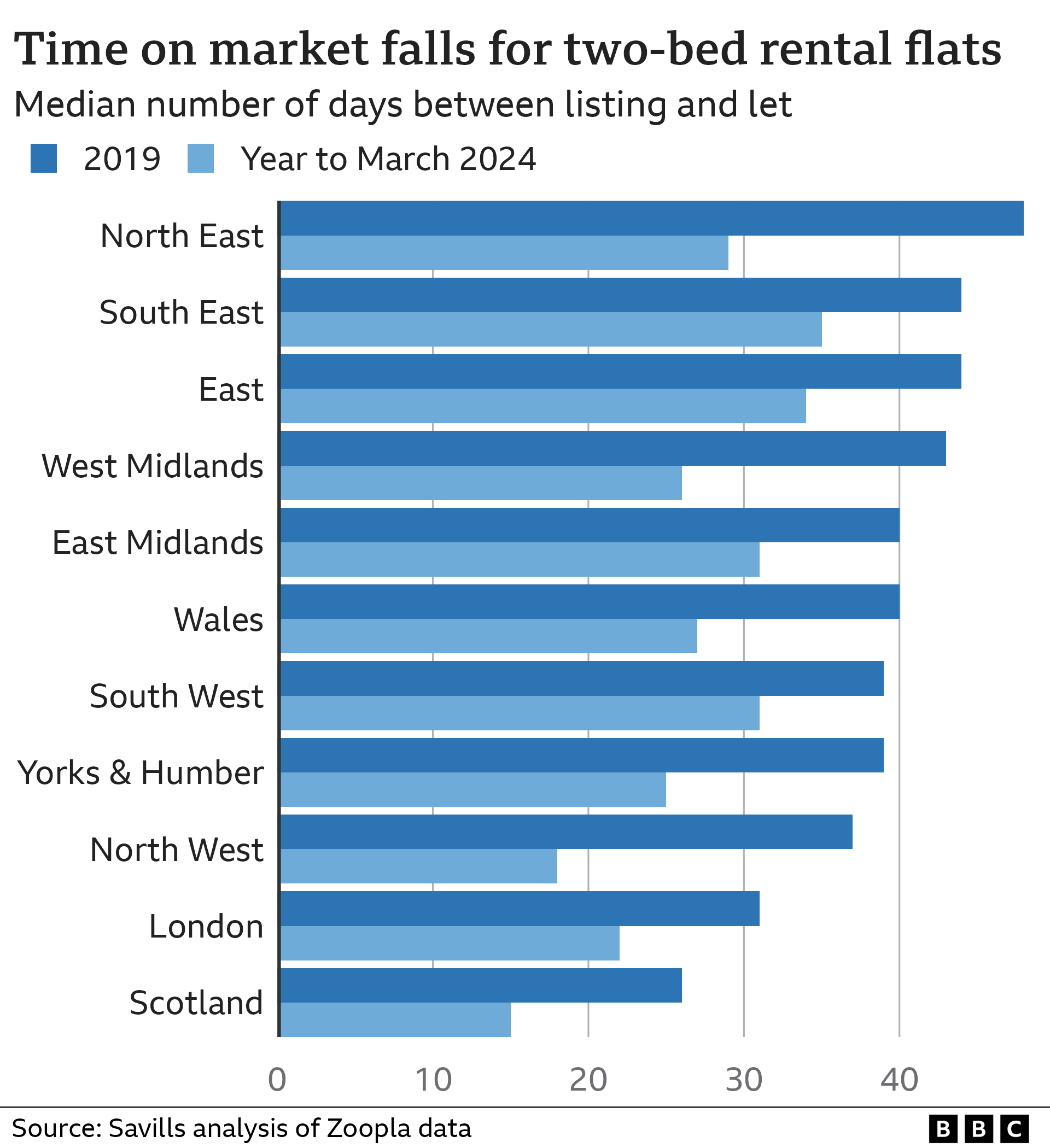Renters in race for homes as listing time slashed

- Published
Intense competition between tenants is creating a race to rent as the amount of time listings are up for gets shorter, figures compiled for the BBC show.
Two-bedroom rental homes are listed on Zoopla for an average of 25 days, some 10 days less than the pre-pandemic average, estate agency Savills said.
High demand and a lack of available properties are forcing potential tenants to make an almost immediate decision on whether to apply for a tenancy.
Agents and landlords say the situation is unlikely to change without more investment in the sector.
Adrian Draude, 32, admitted he and his wife were ill-prepared for the level of competition they faced when searching for a flat after returning from their honeymoon.
"We found properties [on listings sites] that were the perfect fit, saved them for later, went back that day and they had already disappeared," he said.
They have recently found a place in Guildford, Surrey, but Adrian described the process as "aggravating".
"You'd see a place - one minute it was there, and the next it had gone."

Adrian says his search for a flat was frustrating
The couple needed to rent because house prices and high mortgage rates had "turned our dream of owning our own home into a distant fantasy", Adrian said.
They had been saving diligently for years. To do so, he moved back in with his parents for three years.
Returning to, or extending a stay in, the family home is one impact of rapidly rising rents, battles to find property in the lettings sector, and the high cost of becoming a first-time buyer.
Official figures, external revealed 3.6 million people aged between 20 and 34, including a third of young men, were living with their parents last year.
For some prospective tenants, the burden on their parents continues when they ask them to become guarantors.

Cait Sullivan and Lily Jones are looking for a rental property
A guarantor is someone who agrees to pay rent if the tenant is unable to.
It is often a parent or close relative, but some people have even had to ask their boss.
Previously, a guarantor has only been required if a tenant fails the financial checks, but now they are becoming a more common request from agents and landlords.
Cait Sullivan and Lily Jones are colleagues, both living with their parents, and keen to move out.
They said they had to ask their parents to act as guarantors as nearly every viewing had required it.
"It is a bit awkward," said Cait. "You’re wanting to move out to be independent and then you’ve got to ask, 'can you still sign this form and be a guarantor for me'.”
Renting battle
The shrinking choice and faster race for rental properties has been revealed in the figures compiled for the BBC.

Data analysts at Savills compared listings on Zoopla of properties to rent in the 2019 calendar year, and the 12 months to March this year. Zoopla covers about 80% of the rental sector. They found:
The average listing time for a two-bedroom flat in Britain fell from 35 days in 2019 to 25 days in the last year
Competition is even greater in some regions. In the North West of England, a two-bed flat was listed for 37 days in 2019, and has since halved to 18 days
The average is now 15 days in Scotland, where a policy of rent control has been in place
The same trend is seen with larger properties - three-bedroom houses were listed for an average of 39 days in 2019, but for 32 days now, with sharper falls in some areas
Agents in areas with the most intense competition say the situation is unprecedented, and potential tenants need to be even more fleet-footed.
"We can list a property one day, it can have 500 views that day online, we could have 50 enquiries online, following that there are viewings and it is gone within seven days," said Darren Kay, director at TVG Lettings in Liverpool.
Danger ahead
The situation is unlikely to change anytime soon, according to Richard Valentine-Selsey, director of residential research at Savills.
"There is not enough supply coming on to the market, and we need more investment in the sector to bring more homes available to rent," he said.
That included individual landlords and big institutional landlords, he said.
However, the number of properties available to rent may be set to fall, rather than go up.
The National Residential Landlords Association (NRLA) said its survey of members revealed that 31% of those asked said they planned to cut the number of properties they rented out, compared with 9% who planned to increase their offer.
"Landlords selling up is the single biggest challenge renters face. The only answer is to ensure responsible landlords have the confidence to stay in the market and sustain tenancies," said Ben Beadle, chief executive of the NRLA.
The association said guarantor agreements could be useful for tenants who might otherwise struggle to access rental accommodation.
However, Tom Darling, campaign manager at the Renters' Reform Coalition, said: “It’s clear we have housing shortage, but throwing ever more landlords at the problem is not going solve anything.
"We need a more heavily regulated private rented sector along with an expansion of social housing. We’ve called for a ban on landlords selling for the first two years of a tenancy - this would reduce some of the friction we are seeing.”
Additional reporting by Kris Bramwell.

How to get to the front of the renting queue
Agents say there are some simple ways to make it easier to secure a rental property, including:
Start searching well before a tenancy ends and sign up with multiple agents
Have payslips, a job reference, and a reference from a previous landlord to hand
Build up a relationship with agents in the area, but be prepared to widen your search
Be sure of your budget and calculate how much you can offer upfront
Be aware that some agents offer sneak peeks of properties on social media before listing them
There are more tips here and help on your renting rights here.
Get in touch
Are you struggling to find a place to rent? Share your experiences.